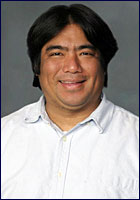Singing out
I'm in two choirs here: one at the church, Kowloon International Baptist Church, and the other is the University (Hong Kong Baptist University) student choir.The student choir is predictably more challenging, but they're both lots of fun. The KIBC choir is singing a Michael W. Smith piece for Christmas, and we've got a lot of music for the student choir, including Beethoven's 9th symphony (which we haven't practiced yet but the choir part for that is fairly short anyway) and a piece written by an HKBU music prof. for the HKBU 50th anniversary bash. We've also got a Negro spiritual. I don't know whether the students here have the cultural background to know what this is about. But they're not getting the sound. Yet.
This is my best opportunity to get into the local culture, since in my classes, I only teach Pepperdine students. I've met a few fellow basses, and there's the same fun camaraderie that there is in a student choir in the US. They're not so physical but they're just as rambunctious.
Asians have a reputation for being shy and reserved. But when they're among peers, the Hong Kongers can be quite gregarious and loud. Especially when the teacher's not in the room and this is especially true about the guys. You don't have random tenors showing off their singing in silly ways (like Dominic Falbo at Pepperdine) but you do have boisterous chatter about random things. About what? I don't know--it was in Cantonese.
I would say that the sight reading abilities are higher than those I've seen in student choirs in the States. That's probably because many more of them know how to play the piano, for instance. But as we are reading through some songs in English, many of them (predictably) have trouble. They can all speak English, but not at the same speed, while also trying to read the notes. So they sign nonsense syllables when they're learning the music.
I did play a role in correcting people's pronunciation. The kinds of pronunciation issues are very different. In the HKBU Prof's piece, there's a part where the text is, "My heart will praise you without ceasing". Some students were voicing the "s" in "ceasing", so that it sounded like they were singing, "My heart will praise you without seizing". Yes. Very different.
I tried to make a joke of it, but I don't think people understood it. They didn't quite get what "heart seizing" would mean. Or "heart ceasing".
This is all very natural to a native speaker, but I realized how difficult this can be for a non-native speaker. Neither "cease" nor "seize" are common words in conversation, and very often, an undoubled continuant consonant between two vowels is voiced, as in "bruised", "bathing", "rising", etc., and you need to have a double consonant to make it unvoiced, as in "passed", "missed", "possum", etc. But then there's "facing", "based", and, well, "ceasing".
I'm glad I'm a native English speaker, struggling with learning Cantonese, rather than the other way around.
At the church, Angie (the music director) was coaching everyone to sing "In excelsis Deo" with a pure "i", as in "een" rather than "inn". That's a common frustration for teaching Latin phrases to English speakers. But it only affected the folks from the US. The native Tagalog and Cantonese speakers in the choir usually make the reverse mistake: when speaking English, saying "een" for "in".
Back to the student choir, we had sectionals, meaning the men and women met separately to practice their respective parts. The conductor had to depend on individual students to help her run the rehearsal. The student guest conductors ran the rehearsal in Cantonese. I had some help from the people around me to figure out what was said, but I think I missed most of it. At least I know the numbers so I could know where what measure we were starting on.
The first day, the conductor made announcements about class policies. Apparently tardiness is a big problem. The section leaders suggested a HK$10 fine for being tardy. One student pointed out that this is in conflict with HKBU regulations on student payments. The conductor asked for suggestions. One that was suggested, and most people liked, was the tardy student would have to sing a solo in front of the class. This seemed to be viewed as quite a deterrent. I don't think it would be a deterrent in the States. It was used once during warmup, and a student had to do a warmup arpeggio by himself, and was visibly embarassed.
Even when asked to guest conduct, the students were in general shy to get up in front of the class, but once the guest conductors were there, they had no problem with poise. One time, when the professor started with the women's choir, the appointed student conductor came to the front and aped the conductor, using his falsetto, copying the professor's phrases in English, to comic effect. I think the shyness might be an act.


1 Comments:
Wow Dr. Iga I didn't realize you were so into the whole choir scene. I used to sing in choirs up until my sophomore yr. in high school when dance just started taking up too much time. The whole pronunciation thing u were talking about is funny because my parents make mistakes like that all the time without realizing that the way they are pronouncing it changes the meaning completely! And they've lived in the U.S. over 20 years. Like you said when they aren't common words used in conversation non-native speakers dont really know the gravity of their pronunciation error.
Post a Comment
<< Home